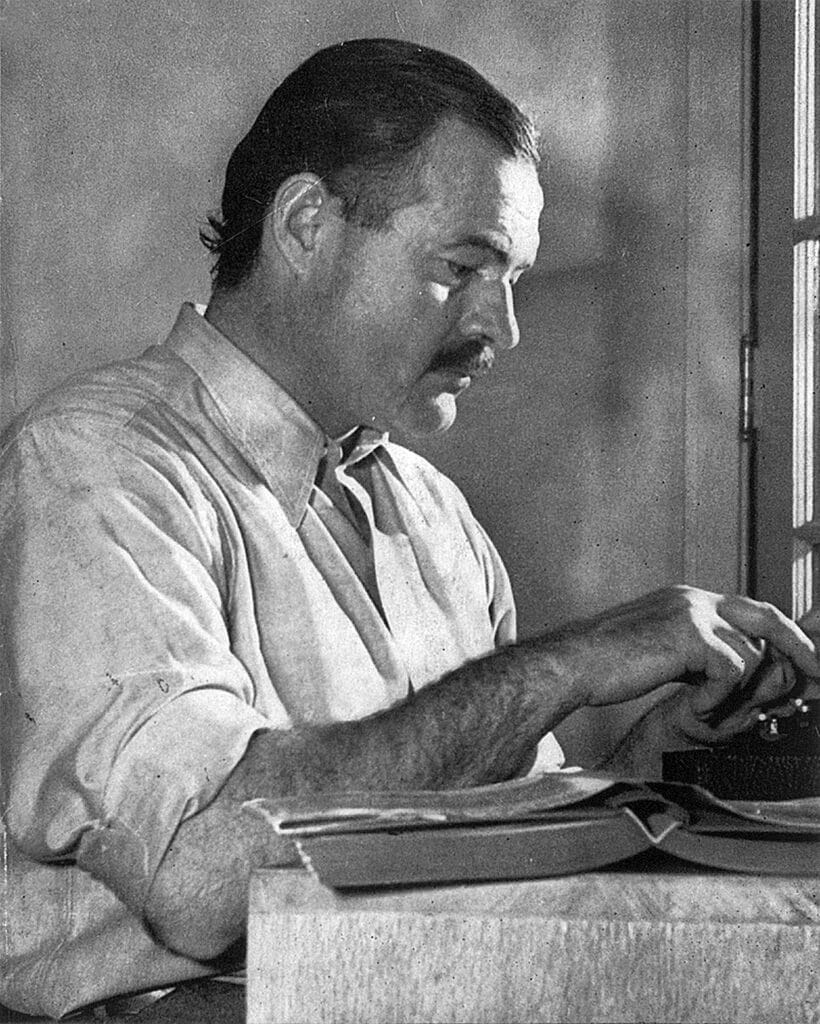Ernest Hemingway
Ernest Hemingway, an emblematic figure of 20th-century American literature, is renowned for his indelible impact on the narrative style and ethos of modern writing. Born on the outskirts of Chicago, Hemingway’s early exposure to literature and his subsequent engagement in World War I as an ambulance driver deeply influenced his thematic and stylistic development.

Hemingway’s literary journey gained significant momentum during his residence in Paris, where he interacted with prominent modernist writers. This period was crucial for Hemingway to refine his distinctive writing style, characterized by an economical and understated approach, famously known as the “Iceberg Theory.” This theory posits that the underlying meaning of a text should not be evident on the surface but should be intuited by the reader through subtext and implication.
His major works, including “The Sun Also Rises,” “A Farewell to Arms,” and “For Whom the Bell Tolls,” offer profound insights into the human condition, reflecting his experiences and observations on courage, loss, and existential despair. These narratives, set against the backdrop of war and its aftermath, encapsulate the disillusionment of the Lost Generation and resonate with the existential discourse prevalent in the 20th century.
Hemingway’s narrative technique, marked by its clarity, precision, and emotional intensity, challenged the ornate prose of 19th-century literature, heralding a new era of storytelling. His mastery of dialogue and character development, coupled with his profound thematic concerns, has left an indelible mark on the canon of American literature, influencing generations of writers and readers alike.
In the academic realm, Hemingway’s work continues to be a focal point of literary studies, offering rich material for analysis in terms of its stylistic innovations, thematic depth, and cultural significance. His approach to narrative, with its focus on surface simplicity and underlying complexity, has been a critical area of study, illustrating the evolution of American literature in the modernist era.
References:
- Britannica article on Ernest Hemingway.
- Biography Online article on Ernest Hemingway.
QUESTIONS FOR FURTHER DISCUSSION: (LEAVE YOUR COMMENTS)
Here’s a list of questions for further discussion that delve into Ernest Hemingway’s life, work, and influence:
- How did Hemingway’s experiences in World War I and the Spanish Civil War shape his views on masculinity and heroism in his literary works?
- In what ways did Hemingway’s minimalist writing style, known as the “Iceberg Theory,” revolutionize 20th-century literature, and how is it reflected in his major works?
- Hemingway’s personal life, including his four marriages and adventurous lifestyle, often intertwined with his literary themes. How can we see this connection in novels like “The Sun Also Rises” and “A Farewell to Arms”?
- Discuss the influence of Hemingway’s time in Paris on his development as a writer. How did interactions with other modernist writers contribute to his literary identity?
- Hemingway’s portrayal of women in his works has been a subject of much debate. Analyze the representation of female characters in his novels and short stories. What do these portrayals tell us about Hemingway’s perspectives on gender roles?
- Examine the role of nature and the natural world in Hemingway’s storytelling. How does his depiction of nature contribute to the themes and narratives of his works?
- Hemingway’s “The Old Man and the Sea” won the Pulitzer Prize and contributed to his Nobel Prize in Literature. Discuss the thematic depth of this work and its significance in Hemingway’s career.
- How did Hemingway’s writing influence subsequent generations of writers? Are there contemporary authors who cite Hemingway as a significant influence on their work?
- Consider Hemingway’s legacy in the context of 21st-century literature. How do modern interpretations of his works and persona reflect changing societal values and literary tastes?
- Hemingway’s life ended tragically with his suicide. Discuss how mental health and personal struggles are reflected in his writings and how they resonate with readers today.
These questions aim to foster a deeper understanding and appreciation of Hemingway’s contributions to literature and his enduring legacy in the literary world.
© 2024, wcadmin. All rights reserved, Writers Critique, LLC Unless otherwise noted, all posts remain copyright of their respective authors.




